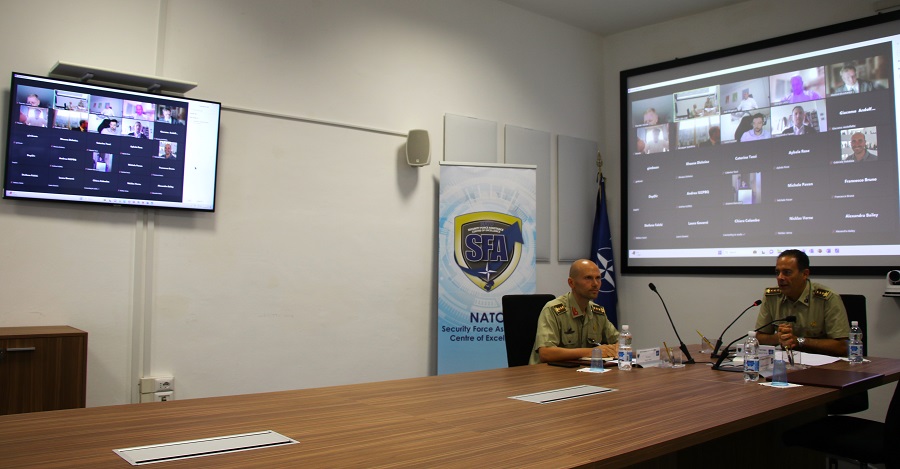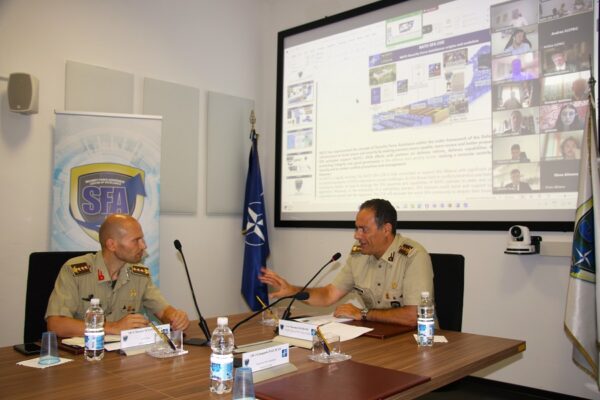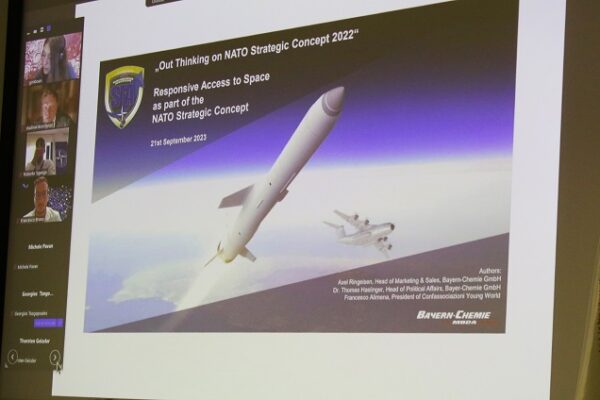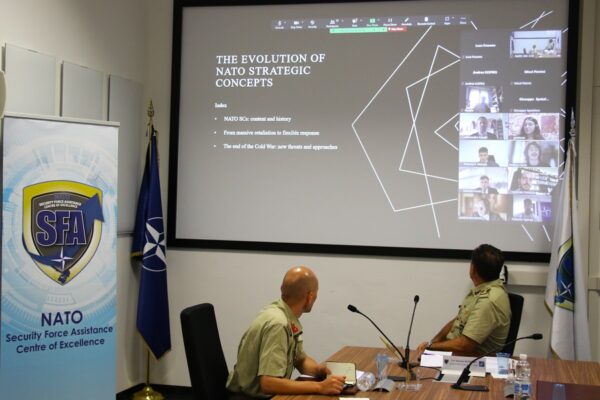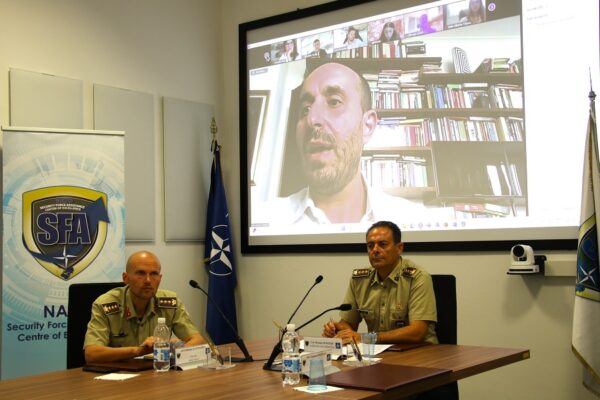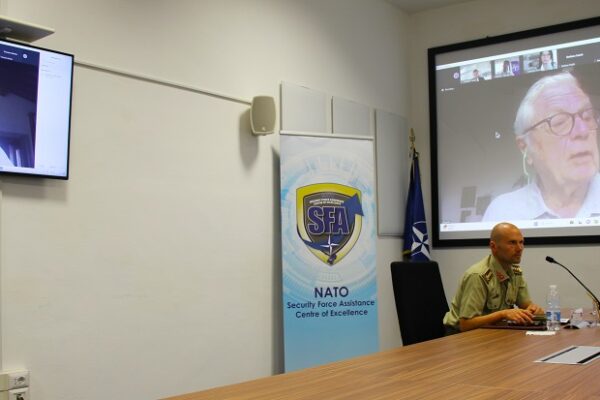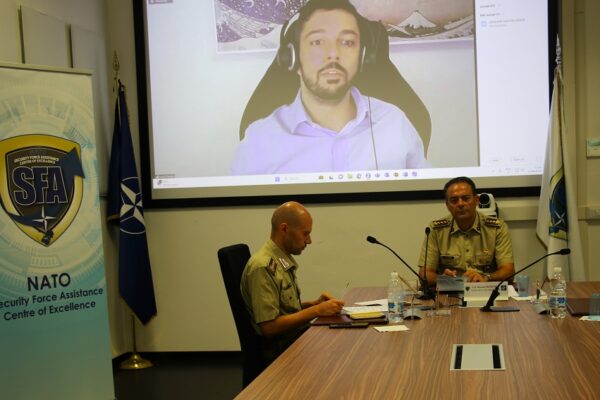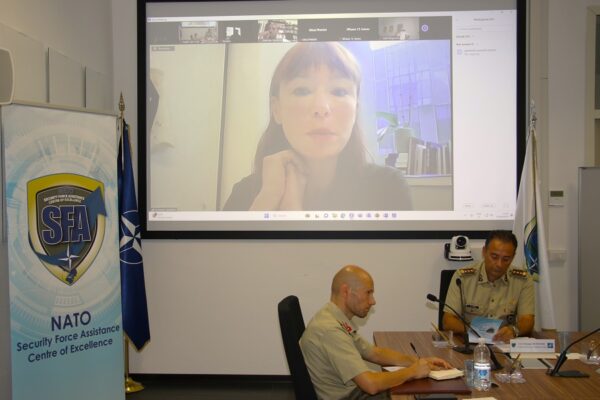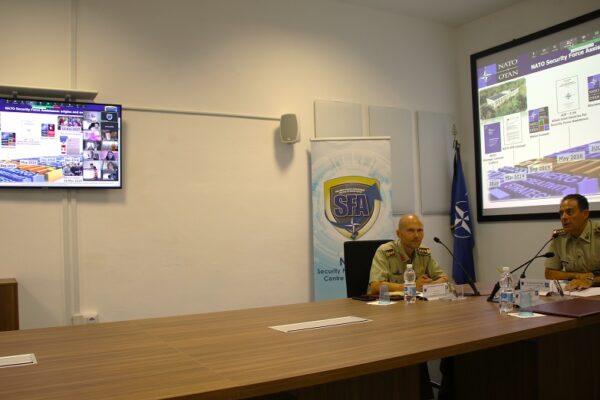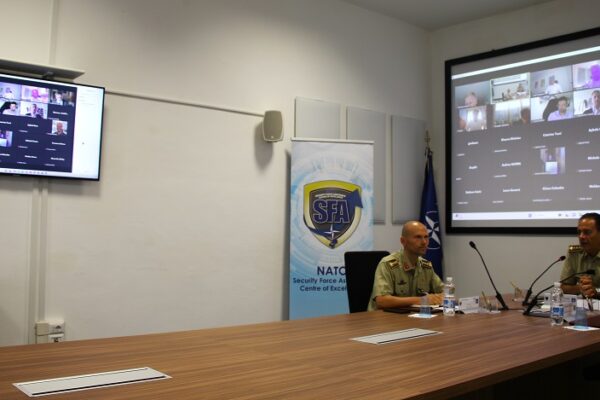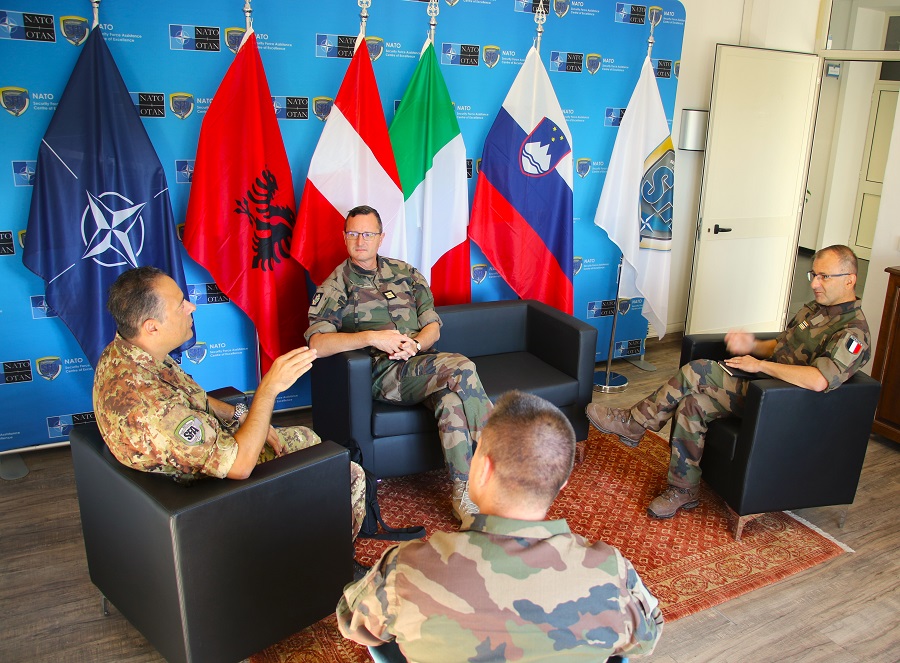On the 21st of September 2023, the NATO Security Force Assistance Centre of Excellence (NATO SFA COE) held an Editorial Roundtable with an international group of experts that has worked on the study paper “Out Thinking on 2022 NATO Strategic Concept” published by the COE.
The NATO SFA COE Director, Colonel Massimo Di Pietro, opened the session with an overview of the connections of the SFA principles and activities to the 2022 NATO Strategic Concept. He emphasized the relationship between Military Capacity Building and NATO core tasks and NATO core policies along the continuum of competition.
After the preliminary insights of Dr. Benedetta BERTI, Head of policy Planning at the NATO SG Office, Dr. Giuseppe SPATAFORA, Policy adviser at NATO’s Policy Planning Unit at the NATO SG Office, provided an overview of the present and future challenges facing NATO and unraveled the 2022 Strategic Concept to present its most salient topics. These are reflected in the four areas of interest in which the study paper is structured.
The first one focuses on security and begins by reflecting on the need to study the Atlantic Alliance’s policies and goals in relation to the changes that have occurred in the strategic environment over the long term. Otherwise, the evolution of such policies and goals over time would be difficult to understand, as effectively illustrated by Dr. Stefano FALCHI and Dr. Vladimir DI COSTANZO. The authors offer a historical perspective on the evolution of post-Cold War threats, concluding with the latest changes that have occurred in the strategic environment. In light of this, Dr. Lilla DOUCHA, Executive Vice President of YATA International, President of YATA Hungary, introduces outer space operations as part of NATO’s expanding effort to “prevent, detect, counter, and respond to the full spectrum of threats”, as declared in the last Strategic Concept. She particularly emphasizes the role of this domain as a growing enabler and enhancer in NATO’s deterrence and defense. On the other hand, Dr. Daniele MANCINI, Italian Ambassador (ret), clearly shows the shift from “security” to “securitization” that took shape with the end of the confrontation with the Soviet Union and the more nuanced aspects of great-power competition in the twenty-first century.
The second area of the volume focuses on the economy. Dr. Luca FRUSONE, Deputy, Italian Parliament Member, on the one side, explains that NATO established a venture capital fund to support innovation and an innovation accelerator called DIANA, becoming aware of the disruptive potential of emerging technologies and the importance of maintaining technological supremacy to achieve success on the battlefield. Dr. Alessandro FANETTI, Geopolitcal Analyst for AIAIG, on the other hand, presents the challenges posed in the economic dimension by the BRICS+, a group of countries formed in the mid-2000s by Brazil, Russia, India, and China, and which has been reinvigorated since 2010 with the entry of South Africa and the development of further collaborations with other countries. According to the author, these powers repeatedly denounce the inadequacy of the unipolar system in the post-Cold War era and advocate for a shift towards multipolarity. After having introduced NATO’s recognition of climate change as a significant challenge for security in the new Strategic Concept, Dr. Benedetta AUSILI, explores its impact on human and national security as well as on military operations.
As for the third area, cooperation, this portion of the volume begins with a contribution written by Dr. Francesco ALIMENA, President of Confassociazioni Young World, where the author analyzes the importance of multilateral cooperation at a historical moment characterized by geopolitical-economic instability and insecurity, as stated in the 2022 Strategic Concept. Dr. Guido LENZI, Italian Ambassador (ret), reflects on the complementarity between the EU Strategic Compass and the new NATO Strategic Concept in the face of the current challenges to Euro-Atlantic security, which allow the two organizations to engage together and with more flexibly in “out-of-area” missions. Then, Dr. Thorsten GEISSLER, Attorney-at-Law based in Rechtsanwalt, traces the history of multilateralism from its inception to the present day, discussing its original expectations, failures, and successes. Furthermore, he also ponders the existence of other viable modalities for NATO to interact with non-member states.
Defence is at the core of the study’s fourth area of interest. Dr. Giorgio LAZIO, Vice Admiral (ret), Honorary President of Mondo Internazionale APS, argues that naval forces offer significant opportunities in the prevention of conflicts and in the development of regional security and stability. For these reasons, according to the author, they can play a pivotal role in favoring mutual trust among allies by the exchange of information and the development of a growing interoperability. Dr. George Tzogopoulos, CIFE and ELIAMEP Senior fellow, on the other hand, explains why Defense Capacity Building and Security Force Assistance (SFA) have become highly relevant. He emphasizes how multinational entities and think tanks like the SFA Centre of Excellence in Rome have become pillars for the implementation of the Alliance’s comprehensive policy and discusses their role in the future of the Alliance, particularly in the aftermath of the Russian aggression of February 24, 2022. Moreover, Dr. Michele PAVAN, CEO of MInter Group Srl and President of Mondo Internazionale APS, reflects on how NATO can prevent crises and provides the reader with an overview of the current and future challenges and opportunities weighing on security in the Euro-Atlantic area. In the following chapter, Dr. Axel RINGEISEN, Head of Marketing & Sales at Bayern-Chemie GmbH, Dr. Thomas HASLINGER, Head of Political Affairs at Bayern-Chemie GmbH, and Dr. Francesco ALIMENA present the outer space as essential for the Alliance’s deterrence and defense, emphasizing its capability to provide secure communications, detect missile launches, and ensure effective command and control for NATO. In conclusion, Dr Francesco BRUNO, Journalist and Media Intelligence Manager, Operations Manager at Volocom and Dr. Andrea FRANCHINI, Journalist, Editorial Director at Volocom, analyze and delve into the so-called “forgotten wars” through data, information, and graphs. They argue that these conflicts do not receive much attention from the media, which often only provide a partial overview of the full scenario, but they risk destabilizing the Mediterranean basin.
The event was concluded with the intervention of Professor Gabriele NATALIZIA, Associate Professor of Political Science at Sapienza University of Rome, moderator of the roundtable, who highlighted the main points of the study paper, and the important role of Security Force Assistance in the wide frame of the 2022 NATO Strategic Concept.








